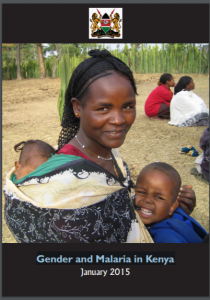Gender and Malaria in Kenya
Gender is a cross-cutting issue that can inform decision making and best practices in all health areas. HIV care and treatment, for example, has benefitted from increased attention to gender inequities over the past decade.
Although transmission of malaria is not comparable to HIV, commonalities such as access to health care and power in decision making are also affected by gender norms and roles. Learning from what we know regarding how gender impacts other disease interventions can and should assist in strategy and planning for effective malaria prevention and response. The Kenya Ministry of Health’s Malaria Control Unit (MCU) recognized the need to incorporate gender into malaria programming and requested technical assistance to ensure that human rights and gender are fully reflected in the upcoming National Malaria Strategy and Monitoring and Evaluation (M&E) Plan.
Gender M&E provides evidence to examine gender differences in who is getting malaria, who is accessing treatment when and where, and what differences exist in malaria prevention and awareness.This gender and malaria review focuses on the monitoring and evaluation aspects of various documents, strategic plans, and current practices in the path toward a malaria-free Kenya. It was completed by a MEASURE Evaluation Gender Specialist through a combination of remote record review, in-country stakeholder meetings, and document reviews.
Source: Kenya Ministry of Health
Date of Publication: June 26, 2019
SIMILIAR RESOURCES
Tools
Examples
- Gender-based Violence Prevention, Risk Mitigation and Response during COVID-19
- COVID-19: Emerging Gender Data and Why it Matters
- Gender and COVID-19 Research Project
- Desk Review of Programs Integrating Family Planning with Food Security and Nutrition
- Pandemics and Violence Against Women and Children
- Intersectionality 101
- What Does it Mean to Leave No One Behind? A United Nations Development Programme Discussion Paper and Framework for Implementation
- 10 Best Resources on Intersectionality with an Emphasis on Low- and Middle-Income Countries
- What Does it Mean to Engage the Public in the Response to Covid-19?
- How Might We Use Communication to Encourage Physical Distancing in Developing Countries
- Health of People and the Environment in the Lake Victoria Basin (HoPE-LVB)
- Suaahara Final Dissemination Documents
- The Business Case for Social and Behavior Change for Malaria with Applications for Côte d’Ivoire and Tanzania
- Investing in Social and Behavior Change is Cost-effective for Improving Malaria Behaviors in Côte d’Ivoire
- Investing in Social and Behavior Change is Cost-effective for Improving Malaria Behaviors in Tanzania

